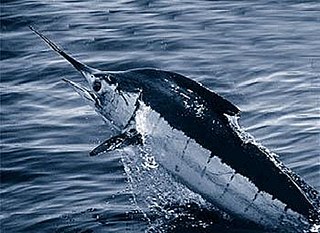
Marlins are fish from the family Istiophoridae, which includes 11 species.
Buzzard is the common name of several species of birds of prey.

The broad-winged hawk is a medium-sized hawk of the genus Buteo. During the summer, some subspecies are distributed over eastern North America, as far west as British Columbia and Texas; they then migrate south to winter in the Neotropics from Mexico south to southern Brazil. Other subspecies are all-year residents on Caribbean islands. As in most raptors, females are slightly larger than males. Broad-winged hawks' wings are relatively short and broad with a tapered, somewhat pointed appearance. The two types of coloration are a dark morph with fewer white areas and a light morph that is more pale overall. Although the broad-winged hawk's numbers are relatively stable, populations are declining in some parts of its breeding range because of forest fragmentation.

The Atlantic sailfish is a species of marine fish in the family Istiophoridae of the order Istiophoriformes. It is found in the Atlantic Ocean and the Caribbean Sea, except for large areas of the central North Atlantic and the central South Atlantic, from the surface to depths of 200 m (656 ft). The Atlantic sailfish is related to the marlin.

The sailfish is one of two species of marine fish in the genus Istiophorus, which belong to the family Istiophoridae (marlins). They are predominantly blue to gray in colour and have a characteristically large dorsal fin known as the sail, which often stretches the entire length of the back. Another notable characteristic is the elongated rostrum (bill) consistent with that of other marlins and the swordfish, which together constitute what are known as billfish in sport fishing circles. Sailfish live in colder pelagic waters of all Earth's oceans, and hold the record for the highest speed of any marine animal.

The billfish are a group of saltwater predatory fish characterised by prominent pointed bills (rostra), and by their large size; some are longer than 4 m (13 ft). Extant billfish include sailfish and marlin, which make up the family Istiophoridae; and swordfish, sole member of the family Xiphiidae. They are often apex predators which feed on a wide variety of smaller fish, crustaceans and cephalopods. These two families are sometimes classified as belonging to the order Istiophoriformes, a group which originated around 71 million years ago in the Late Cretaceous, with the two families diverging around 15 million years ago in the Late Miocene. However, they are also classified as being closely related to the mackerels and tuna within the suborder Scombroidei of the order Perciformes. However, the 5th edition of the Fishes of the World does recognise the Istiophoriformes as a valid order, albeit including the Sphyraenidae, the barracudas.

The Indo-Pacific sailfish is a sailfish native to the Indian and Pacific Oceans and is naturalized in the Atlantic where it has entered the Mediterranean Sea via the Suez Canal as a Lessepsian migrant. It is dark blue on top, brown-blue laterally, silvery white underbelly; upper jaw elongated in the form of a spear; first dorsal fin greatly enlarged in the form of a sail, with many black cones, its front squared off, highest at its midpoint; pelvic fins very narrow, reaching almost to the anus; body covered with embedded scales, blunt at end; lateral line curved above pectoral fin, then straight to base of tail. They have a large and sharp bill, which they use for hunting. They feed on tuna and mackerel, some of the fastest fish in the ocean. Most authorities only recognise a single species of sailfish, I. platypterus.

The Puerto Rican broad-winged hawk is an endangered subspecies of the broad-winged hawk. It is a small hawk that occurs in Puerto Rico, inhabiting the Toro Negro State Forest. It is restricted to the montane forests of the Cordillera Central, Sierra de Cayey, and Sierra de Luquillo. It was federally listed as endangered on September 9, 1994. This species occurs in elfin woodland, sierra palm, caimitillo-granadillo, and tabonuco forest types of the Río Abajo Commonwealth Forest, Carite Commonwealth Forest, and El Yunque National Forest as well as within hardwood plantations, shade coffee plantations, and mature secondary forests. In 1994, the Puerto Rican broad-winged hawk population was estimated at 125 individuals islandwide.

Diogmites is a genus of mainly neotropical flies in the family Asilidae or robber flies.
Diogmites missouriensis is a species of robber flies in the family Asilidae.
Diogmites discolor is a species of robber flies in the family Asilidae.
Diogmites ternatus is a species of robber flies in the family Asilidae.
Diogmites misellus is a species of robber flies in the family Asilidae.
Diogmites sallei is a species of robber flies in the family Asilidae.

Diogmites basalis, the New York bee killer, is a species of robber flies in the family Asilidae.

Diogmites angustipennis, commonly known as the prairie robber fly, is a species of robber flies in the family Asilidae.
Diogmites salutans is a species of robber flies in the family Asilidae.

Diogmites properans is a species of robber flies in the family Asilidae.

Tribulus platypterus, the cork hopbush, is a species of flowering plant in the family Zygophyllaceae, which is endemic to the northwest of Western Australia. It is closely related to Tribulus suberosus.












